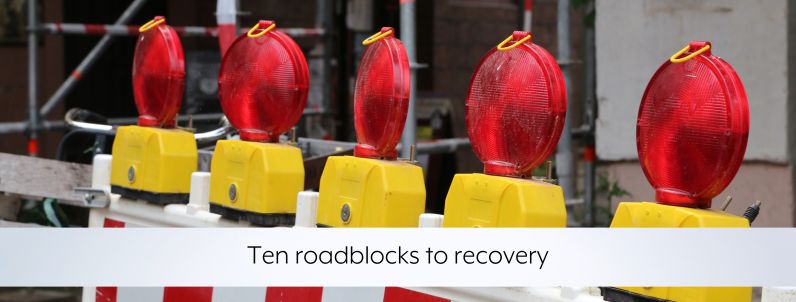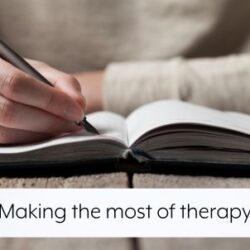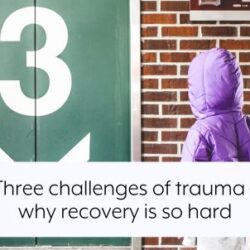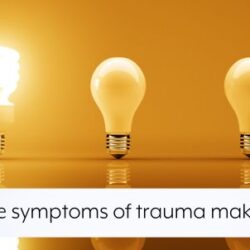
1. Believing that recovery isn’t possible
‘Recovery is impossible. Even the use of the term ‘recovery’ is cruel, taunting people who cannot recover with the false hope that it is, and shaming them in the process.’
So said a fellow delegate at a recent conference, enraged a tagline we used to use: ‘making recovery from dissociative disorders a reality.’ And I used to agree with him. Everything I had ever previously known about ‘mental illness’ – erroneously – was that it was incurable and progressive. It was a revelation for me to read the century-old writings about ‘dementia praecox’, later labelled ‘schizophrenia’, that gave birth to this misinformed orthodoxy. It took me even longer to separate out ‘mental illness’ from ‘mental distress’ and realise that my symptoms were post-traumatic in nature and simply the clamourings of unhealed suffering. It took me longer still to realise that our brains and our bodies are designed to heal, and that we can co-operate with that process.
It was Janina Fisher, amongst others, who opened my eyes. Referring to the survivor of trauma, she wrote: ‘… if she had the ability as a small child to survive these terrible experiences, then she has all she needs to recover from the symptoms of those experiences.’ It helped change my perspective of myself, from a defenceless victim, powerless, devoid of resistance, to a resourceful survivor, courageous and persistent. We survived the real thing, unremitting trauma itself, when we were children. So surely now as adults, with support, we can survive its aftershocks. I began to believe in recovery firstly because I understood the logic of it, and secondly because I began to experience it myself. I began to understand recovery, not as a ‘treatment’ that is done to us, but as an orientation of my heart, as something that I can take hold of, because I’m powerless no longer. Recovery is possible, but only if we believe it to be so.
2. Believing that I am mentally ill and ‘crazy’
To suggest that DID is a mental illness is to suggest that something has gone wrong in the brain, that some form of medicine may be needed to treat it, that this ‘illness’ may recur, and that it may even be contagious. Likening mental distress to physical illness is inadequate because it pathologises our normal, human suffering and places it squarely in the medical model, at the whim of doctors and ‘experts’ who can label our experiences as abnormal. I came to realise – eventually – that nothing had gone wrong with my brain: my brain did good. It helped me survive the unendurable by switching off, by limiting my awareness, by refusing to join up as a whole what is too much for a child’s brain to bear.
I came to realise that my brain isn’t sick. It’s what happened to me that was sick – and arguably the people who did what they did to me. My brain just reacted in the best way it could to keep me alive, and to keep me sane. DID is an adaptation to an abusive or traumatic environment. But once that environment changed – once, as an adult, I became safe – I needed to set about the process of re-adapting my brain to a different environment, one where it didn’t need to be so focused on threat and trauma and pain. That is the process of recovery, to mould my brain to a new, non-traumatic environment, not to mend it from dysfunction or cure it from illness. My brain had to learn to focus anew on exploration and relationships and joy. Dissociation was logical when I was a child in an unsafe environment. It only became illogical when I persisted in it as an adult in safe surroundings.
3. Disempowerment by the recovery process
My life is my own now. I am an autonomous human being – an adult – with the right to make choices and decisions about my own life. But that belief was a long time coming. As a child I had few, if any, choices, and abuse stripped me of my free will. Recovery has involved becoming the adult I am, and gaining my freedom to act as I want to: a victim no longer, but a survivor with self-agency.
In this process of recovery, therefore, it was paramount that I was not disempowered by the very people and institutions that were meant to be helping me. Am I given choice, or are my choices made for me? Am I disempowered by an ‘expert’, someone with all the knowledge and all the power, who doles out a ‘treatment’ to me that I don’t even understand? Or am I empowered by a skilled but humble human being, coming alongside me, not one over me but with me, on a level?
I have been extremely fortunate in the people who have helped me. They have empowered me to discover my own agency, my own ability to act, to find my own identity and forge my own destiny. They have insisted that I sit in the driver’s seat: they have held the map, and only occasionally pulled the emergency brake. Had I been disempowered by ‘experts’, I might not have learned that I am in charge of my own recovery, and that my life is my own to choose now.
4. Making excuses for bad behaviour
All of us want to behave badly, at least some of the time. After a lifetime of neglect, of not being noticed, of pain going unsoothed, it is a powerful thing to receive comfort and attention and care. We start to discover the unspent rage within us, the greedy grabbing entitlement that says that the world owes us, because of what happened to us. It’s hard to blame our abusers, so mostly we blame ourselves. But then we begin to blame others – our GP, our counsellor, our partner, our friend. We hold them culpable for the acts of others, events from years ago. We unleash our outrage, behaving badly, and then we justify it with, ‘It wasn’t me … I don’t remember … It’s not my fault … I can’t help it.’
But recovery is not recovery if we assume the role of the perpetrator. Recovery demands that we take responsibility for the behaviour of all the different aspects and parts of ourselves. It was an easy-out for me to let my ‘Dark’ part smoulder and growl; it was expedient to let my teenage parts seethe with adolescent angst. It was harder to accept that their behaviour was mine too, and that by connecting in to these disowned parts of me I was going to have to acknowledge that I wasn’t always the person I wanted to be. But this is recovery too: becoming more than our symptoms, our struggles – becoming who at core we aspire to be. Recovery is about becoming whole as a human being, the best human being we can be, and not using our suffering as an excuse to impose suffering on others.
5. Viewing triggers as gremlins, not guides
Triggers came unbidden, unwarned, unwanted: and suddenly bam! I was triggered. Before conscious thought had chance to intervene, my body engaged in a fight-flight-freeze response. Back came the terror, the powerlessness, the rage: the visceral memory of childhood trauma. It was terrifying to endure, but eventually I learned that triggers are not a sign, as I so desperately feared, that I was mad. Triggers are merely signposts to what has yet to be integrated in my memory and experience. They are a conditioned response meant to help me, to keep me safe, to avoid something that caused me harm in the past.
But our survival-based back brains aren’t smart – they generalise, they extrapolate, they guess: preferring to err on the safe side, they identify a superfluous detail, like ‘beard’, as a signal of impending threat. Our back brains can’t deduce (yet) that lots of men have beards, and that beardedness is not a good predictor of abuse. So it screams a warning at us now, until our front brains can assimilate new data from our now-safe environment, where beardedness is simply a personal grooming preference that speaks nothing of the motivation to perpetrate: like the colour red, or the sound of footsteps, or the odour of sweat, or the feeling of cold.
But triggers came with such overpowering affect, an echo of the feelings I had at the time. So I avoided them at all costs. It took a long time for me to recognise that by doing so I was ignoring their vital message. Triggers are clues about what is still dissociated. I used to complain often that I couldn’t remember what happened to me, but then I discounted the hints, stored in procedural, implicit memory, that triggers offered me. Recovery involved accepting triggers as messengers, and learning to listen to the message that they brought, rather than building a life of distraction and noise.
6. Believing that I am a victim
When I was young, I was overwhelmed by trauma so huge that my brain couldn’t deal with it. I was a child then – of course I couldn’t deal with it. But trauma has a tendency to freeze in place the self-perceptions we held at the time, and many of us struggle to update our ‘mental maps’, our ‘internal working models’, with the new information that tells us that we are children no longer, that we are overwhelmed no longer, and that we can and must now make decisions to act.
Slowly it began to dawn on me that recovery would remain forever out of reach if I continued to see myself as a victim, or as a child, overwhelmed and powerless. I had to teach my brain instead that things are different now, that new resources are available, that ‘it’s not happening now’. I had to see myself not as a powerless, pathetic victim (urgent and primeval though that belief was), but as a resourceful, resilient survivor. It didn’t come naturally at all: I had to work at it. I couldn’t choose what happened to me as a child, but I could choose how I viewed myself now as an adult who survived that.
Later I learned about Attachment Theory, which teaches us that ‘the stance of the self towards experience’ (Main, 1991) is paramount, that it’s not what happened to us that dictates our destiny so much as how we view ourselves. And I began to realise that recovery was tantalisingly near: because if it is rooted in how I view myself and my experiences, rather than the experiences themselves, then I have some power over it. No one can dictate to me how I should think about myself (although many still try): it’s entirely up to me. I am who I believe I am: spirited survivor, not voiceless victim. And that is the very basis of recovery.
7. Believing we’re the sum of our symptoms
The experience of DID has been at all times both strange and overpowering. I experience blanks throughout my day – ‘microamnesias’ where I’ve switched to another part of the personality, and the integrating strands of memory haven’t carried through to my main stream of consciousness. I feel depersonalised and derealised. I smell memories – odours not from the here-and-now, but from the there-and-then. I experience ‘body memories’. I feel myself slipping into a deep well within myself, and the voice that emanates from my mouth sounds child-like and confused. I observe my surroundings as through a tunnel, detached and out-of-control. This is the reality of my subjective experience of DID. It’s not hard to see how our ‘symptoms’ – these experiences born of the disintegrating effects of trauma – dominate our vision, our hearing, our thoughts, our sense of self, our volition. Knowing that we are different, we seek out others who share our ‘sanity’. It’s a relief to find others who experience life like we do. It’s a relief to know that we are not alone, and maybe not so crazy after all.
But recovery insists that we keep our sights set also on the beyond, not just on the now. Our symptoms are real and valid and true. But there is also a beyond, and recovery insists, even in the chaos and turbulence and stupor of dissociation, that we retain the knowledge that our symptoms are the symptoms of trauma, and trauma can be healed. It doesn’t feel like it, when the entirety of our self is consumed in the shudder of a frightened four-year-old part of us. It doesn’t feel like it when the pain and distress is intolerable. But recovery means that even in the midst of our misery we begin to ‘mentalise’ – to step back from our here-and-now, this-is-it experience, and see that there is a wider perspective and that what we are feeling now, we will not always feel, and that other states of mind exist, which we will experience at other times and on other days.
We have to believe that we are more than the sum of our symptoms. When we settle for anything less, we limit our recovery, because we allow ourselves to be defined by what happened to us: the oversensitisation of our neurobiology and the fragmentation of our sense of self. Recovery means that we connect the dots between all the different parts of ourselves: the different experiences, emotions, outlooks; the desires, and hopes and fears; and we become the person that we truly are, the whole that is greater than the sum of all its parts. I had to believe that I was more than a collection of symptoms, and forge forwards into the entirety of my being.
8. Fighting battles we cannot win
For so long, life with DID felt like a battle that I could never win. It was a daily onslaught by a sly, invisible enemy. At first I underestimated how much effort would be required of me to fight through to a place of healing and recovery. It has taken years, and life continued to happen even while I fought: I got sick, others got sick, I had money troubles, relationship troubles, career (or lack of it) troubles, family troubles. I realised eventually that life will not always give us a break while we fight to recover. I was struggling on so many fronts, and eventually I realised that I could not fight and win every battle that came my way. I had to concentrate my efforts, and learn to walk away.
But I wanted to fight. I wanted to fight for justice, of the ‘criminal justice’ kind. I wanted to fight for treatment and support, for compensation or an apology. We all have our battles. Others fight for the right treatment for the right length of time from the right people; for understanding from the Benefits Agency; for fair treatment from employers; for compassion from family and friends. They are worthy battles. Of course what happened to us as children was wrong; of course we were let down by non-abusing bystanders; of course society shouldn’t have let it happen; of course we deserve fair treatment and long-term support and all of our human rights now. But we can’t fight every battle every day. Sometimes we have to prioritise.
And sometimes we feel that our recovery is contingent on others: that we will recover if our abusers go to jail; or if we get the ‘right’ therapist (usually an NHS one); or if we are awarded Personal Independence Payment. Some of these battles are worth fighting, because they are taking ground en route to overall victory. But sometimes we are so caught up in the need to fight – the trauma response of fight, flight and freeze – that we don’t stop to think about whom we’re fighting, and why, and what the outcome might be. Sometimes the only person we hurt with our fighting is ourselves. What Judith Lewis Herman referred to as a ‘survivor mission’ is undoubtedly a major part of recovery, but sometimes we’re fighting because we’re angry, instead of fighting to recover. If we can focus our energies on recovery, we’ll find strength later for other battles.
9. Pursuing avoidance
When I was a child, the only thing I could do – literally the only thing – was to push away the consciousness of what was happening, stuff the feelings down into a chasm of emptiness inside, and avoid, avoid, avoid. It’s a good strategy, and it worked. It still works now, and sometimes it’s essential: when we’re at work, or responding to the demands of everyday life, it’s a good thing to avoid the trauma, so that we can go on with living. But avoidance was my only strategy for dealing with the trauma. It didn’t occur to me that the trauma could be resolved, not just avoided.
Avoidance comes in many forms, perhaps the most potent of which are intellectualisation and fantasy. With the former, we talk about DID, we read about DID, we research DID, we hypothesise about DID. Anything other than facing the trauma, and working it through. We try to drown out the trauma with a multitude of words. With fantasy, we live in a complex world of ‘alters’ and ‘littles’ and ‘systems’ and ‘hosts’, elaborating what is undeniably real – the polyfragmentation of DID and complex trauma – until our self-representation becomes in itself a form of avoidance. We have picnics, play games, watch cartoons – but it can become our sole focus and we avoid working through traumatic memory, or building secure attachment, or mentalising, or learning to regulate our emotions.
Younger parts are real: I have and have had many of them. Through them I learned to have feelings, to ‘go there’ a step at a time with the trauma narrative. Through the detachment of being not-me, I could explore concepts of my self and my family and my upbringing that were otherwise too overwhelming. Each of my parts had a function and a purpose. But each also contained a temptation: to avoid the hard edges of adult life, to avoid – as adult, me-me – the reality of the trauma and the tidal wave of emotions it brought with it. I had to work against avoidance – I still do.
I had to commit myself to doing the work, pulling the pieces together, integrating the dissociated fragments, owning this trauma as my trauma, owning these feelings as my feelings. I had to learn that these echoes of the trauma would not kill me and that I could face it myself: that I didn’t need to switch to another part of my personality at the first whiff of a feeling. I had to ask myself why I couldn’t be vulnerable myself, rather switching to a four-year-old representation of myself to ask for help. When my focus was solely on ‘being DID’, solely on mapping ‘who’s who’ rather than engaging with these disowned parts of me, then the avoidance was a dead-end and I didn’t move forwards.
10. Perpetuating the abuse
I never saw myself as an abuser. It was a horrific thought. I hated everything that had ever been done to me, and never would I want to do that to another human being. And I haven’t. Not to other people. Only to myself.
The irony was lost on me for a long time: here I was, paying privately for therapy, committing hours every week to the sessions themselves, the travel, the journalling, the preparation. Because I wanted to recover: recover from abuse. And there I was, abusing myself at every juncture: self-harm, criticalness, perfectionism, neglect. Compassion, let alone self-compassion, was a strange concept for me: I had experienced so little of it that I didn’t really know what it was. When I experienced compassion from others, at first I assumed it to be a trick, part of the grooming process. Over time I began to realise that it was genuine. The harder part was to show compassion towards myself. It was so much easier – so much more natural! – just to hate myself. Frustration erupted easily within, at my many failures, my many struggles, my seeming inability to ‘snap out of it’ and ‘get a grip’. It was only through accepting that dissociation was logical and that I had done the best I could do, at the time, to survive, that I began to be able to offer – grudgingly at first – any empathy or grace towards myself.
But it transformed things. It meant that on any given day, I could struggle, I could fail … but I didn’t then need to add to the struggle by beating myself up for it too. Sometimes the greater pain is the pain we cause ourselves, with our acerbic tongue, our punitive self-loathing. The names we call ourselves: ‘failure’, ‘loser’, ‘idiot’. The rage we unleash upon ourselves when we feel feelings of neediness, or weakness, or vulnerability. It’s all we used to know: that was the environment we grew up in, where soft words and tender words and kind words were rare. But that’s not the environment we have to live in now, and we don’t have to play victim to ourselves and our own self-hatred. We can learn to show ourselves understanding and compassion, kindness and patience. It didn’t happen overnight. It didn’t happen, with me, for several years. But I have become convinced that recovery from abuse only and ever comes through putting a stop to the abuse, and especially the abuse that we direct at ourselves. I’m not pathetic, an idiot, stupid, crap. I am a survivor of awful abuse. I did my best to survive it, and I’m doing my best now to recover from it. I’m doing ok. I am ok: to be able to say that, surely, is one sign of recovery.



1 Comment
I am a master avoider. A part of me is completely attracted to my therapist; part of me says I’m a loser for allowing myself to “go there” so to speak. Part of me says therapy is just a waste of my time, another part wants to learn as much as possible. Another part was to rage at my therapist for every little thing, another part just wants to leave and go have coffee and hang out. I want to hope and believe that recovery is possible. I have become obsessed with discovering my “parts” and figuring out their ages/beliefs. A part of me wants to deny years of abuse ever happened and can’t talk about it much. Part of me realizes I know what happened I just have to be brave enough to allow myself to find those memories and process them. I am working through the trauma, but it has been a slow and painful process. Some parts distract me from dealing with them, thus a master avoider. Great article! So helpful to me!